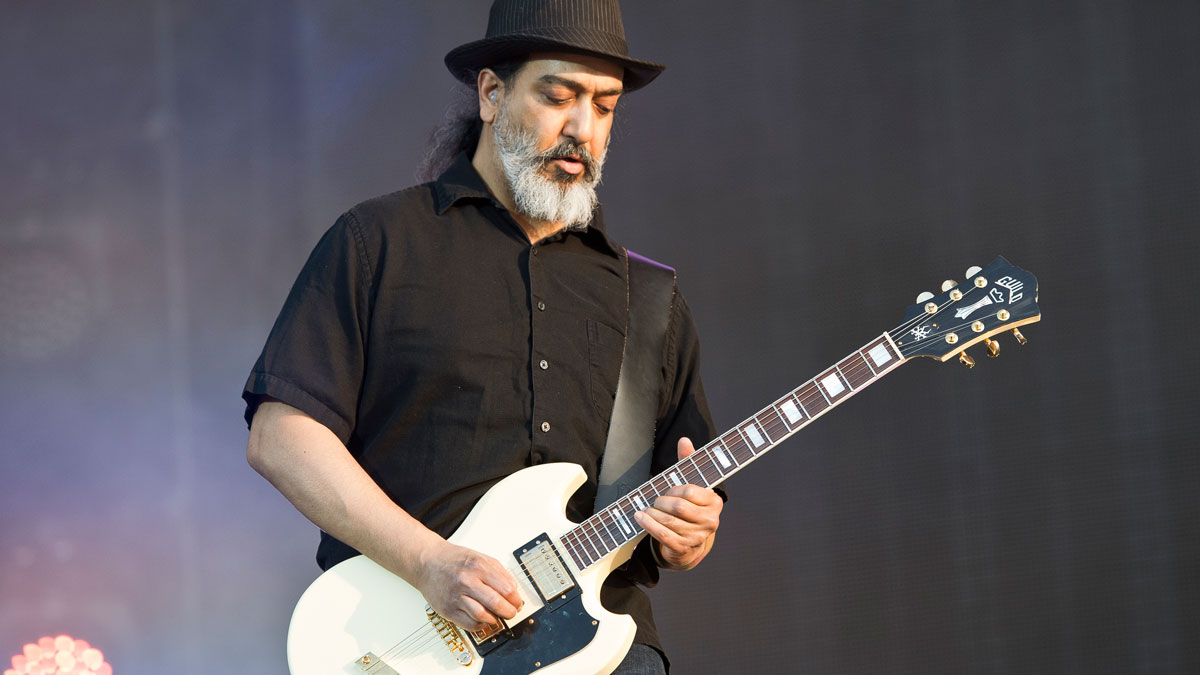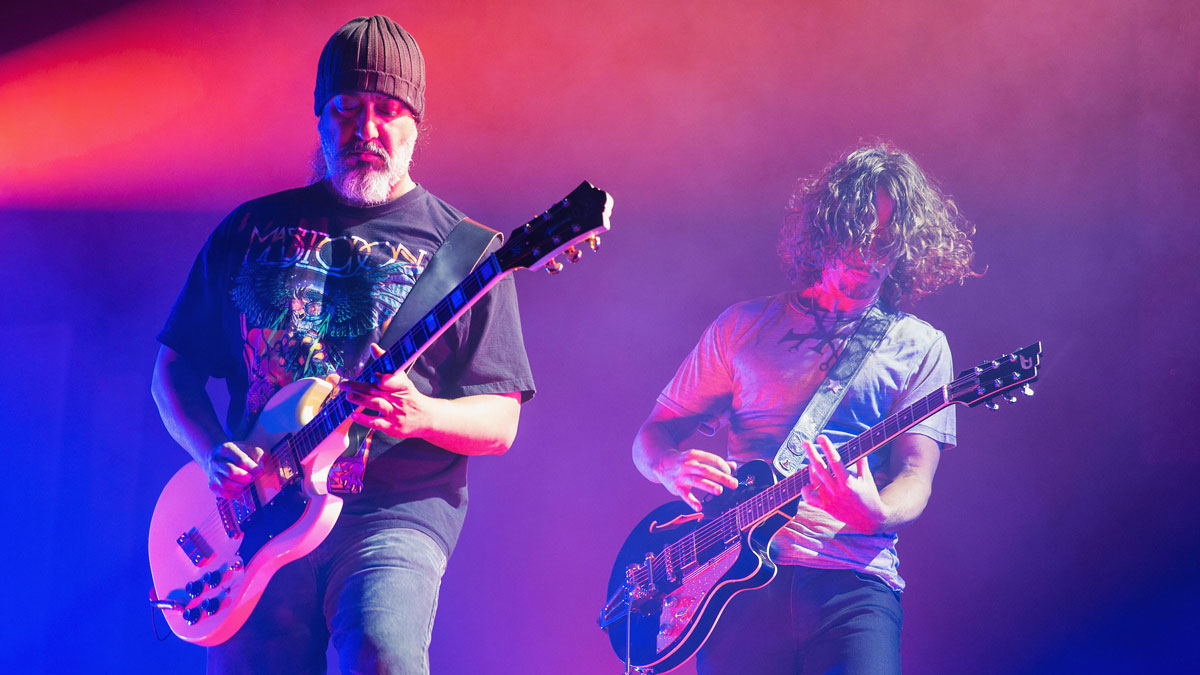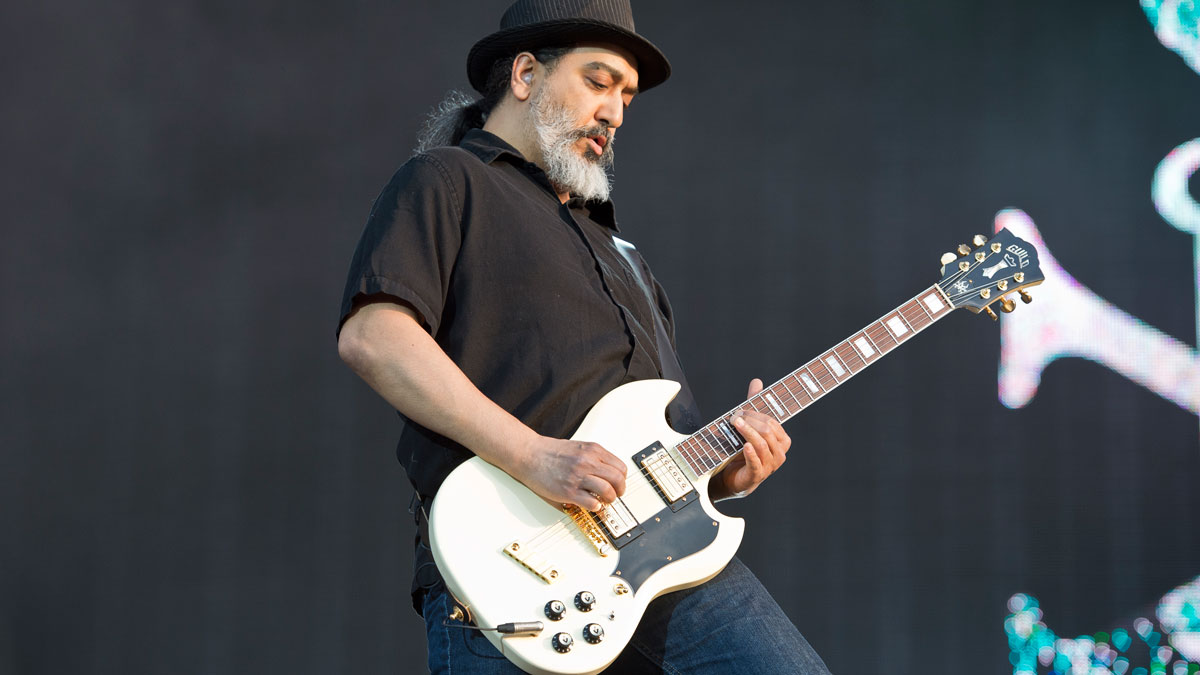Soundgarden’s Kim Thayil: “I’m not on a first-name basis with my gear; I just know it’s Mr Mesa/Boogie and Mr Guild!”
The idiosyncratic guitarist on the Seattle greats’ ferocious Artists Den live release, his guitar partnership with Chris Cornell and what’s holding up the band’s final album

Want all the hottest music and gear news, reviews, deals, features and more, direct to your inbox? Sign up here.
You are now subscribed
Your newsletter sign-up was successful
When performing alongside a frontman as iconic as the late Chris Cornell, many players could find themselves overshadowed, but seeing riff torchbearers Soundgarden live never failed to shine a spotlight on three of the most original instrumental voices to come from Seattle.
Cornell, guitarist Kim Thayil, bassist Ben Shepherd and drummer Matt Cameron united to form an alt-rock leviathan that veered violently between devastating heaviness and psychedelic wigouts - it’s this transcendent dynamism that’s captured on new concert film Live From The Artists Den, a 29-song, two-and-a-half-hour document of the band’s final stop on their 2013 King Animal tour.
The film was taken one step further by a series of immersive, multi-screen viewing experiences earlier last month, held at the location of the gig’s original venue- The Wiltern in Los Angeles - as well as New York and the band’s home turf.
The Wiltern showing was a strange event for Kim Thayil, who was on hand to introduce the film and watch the entire gig back in excruciating detail.
“I generally don’t like having to do that with an audience, because then we get to share in all the self-conscious responses to my errors,” he laughs. “There weren’t many of ’em… that you know of!”
The guitarist has nothing to worry about; the band is on propulsive form throughout, bringing fresh energy to longtime live staples, as well as nearly every track from their sole post-reunion album King Animal, plus rare cuts Blind Dogs and New Damage.
It was a bit bittersweet to see the band... and certainly to see Chris
“It’s a little bit weird having people watch, but what can I do - there were a few thousand people watching when the performance was being recorded, so I can’t adjust for that. But it’s fun; it’s definitely fun,” Kim pauses. “It was a bit bittersweet, too, to see the band... and certainly to see Chris.”
Want all the hottest music and gear news, reviews, deals, features and more, direct to your inbox? Sign up here.
Two years on from his untimely passing, Cornell’s shadow looms large over Soundgarden’s legacy, but Thayil is in high spirits as he discusses his guitar partnership with the frontman and the band’s sonic evolution.
In a wide-ranging conversation, he speaks candidly of the three thwarted attempts to make a Guild signature model, his future musical plans and the real status of Soundgarden’s unfinished final album.
When you look back at the Artists Den performance, what are you most proud of?
“That we didn’t overplay, which you can do if there’s cameras on you. We didn’t collapse out of the anxiety and stress of having those same cameras on you. We managed to maintain our composure and play with aplomb - there’s no showboating or nervous stumbling, other than what might typically happen in a live show.”
Was there anything you noticed about your guitar playing?
Every time we played a set, Ben and I, and Matt, and oftentimes Chris would just wing the improvised or solo parts; we’d just be like, ‘Let’s see what happens!’
“You know, I think there was a little bit of - not timidity - but I think I was holding back a little bit for that show, because we knew that there were a lot of cameras on us, and there were extra lights that were on us to illuminate the camera shots, it made the stage much warmer, much brighter than we were familiar with.
“So there was a little bit of self-consciousness, so I think I held back a bit. There are certain songs that we performed that we might take extended jam sections or solos, or we might improvise a little bit more, or reach and do something unusual.
“Every time we played a set, Ben and I, and Matt, and oftentimes Chris would just wing the improvised or solo parts; we’d just be like, ‘Let’s see what happens!’ I think we played a little bit more conservatively because of the cameras and the lights - I could see that in my playing.”
How would you say Soundgarden evolved as a live band over the years?
“I think in the early days we certainly used a lot more feedback and noise, and we were maybe a little bit more psychedelic; we would use feedback as another instrument, to augment the ambience on stage and create a sort of psychedelic thing. We were a little bit more quirky when we started out.
“We became heavier, and we emphasised psychedelic elements in the heaviness, but over time - through a change in drummer, when we got Matt in the band, and later when we got Ben in the band - a lot of the quirky elements returned. That has to do with the playing style of the individuals that were in the band that fostered certain songwriting. And I think that affected how we played live.
“As we became more song-orientated, especially when Chris wrote songs that maybe were more friendly to releasing a single, those songs, the way they were arranged had less flexibility in them. You wanted to hear the verse and the chorus the way they were arranged, and they weren’t really as loose.
“But we still wrote songs like Slaves & Bulldozers, or Jesus Christ Pose, and that would incorporate the more live, spontaneous elements of the band, so I’d say that over time, the band became a little bit more proficient, as individual players, and in communicating with each other.
“I don’t want to say we became more controlled, but we were tight when we had to be tight - because you’re going from 7/4 to 4/4 or whatever - and we were loose when you wanted it to be loose, because the song required a sort of trippy, spontaneous element.”
How did you feel like your guitar playing changed over the years, especially since the reunion?
Occasionally we’d do something that was a little bit out of the element of a person’s particular style, and that would necessitate that they adjust and grow and accommodate the material
“I had just turned 24, or might have been 23 when the band started. I mean, I’m not the same person I was when I was 23; I have a different attitude towards my relationships, and a different attitude towards the instrument. And that would include the relationship I had with the guys in the band.
“When you have great players, like Ben and Chris and Matt, they certainly create an environment that would encourage my ability and vice-versa for the other players. And I think everyone got better; I think we challenged each other - the kind of songs we’d write would play to the strengths of other players, and occasionally we’d do something that was a little bit out of the element of a person’s particular style, and that would necessitate that they adjust and grow and accommodate the material. So I think all of us certainly grew, but I definitely recognise that with myself.”
It’s interesting you say that; when we spoke to Chris about the Ultramega OK reissue, he mentioned how encouraging you were when he first began playing guitar in Soundgarden - what are your memories of Chris’s first guitar contributions to the band?
“Well, you know, he wasn’t that great a guitar player initially, but he wanted to use the guitar as a way to write songs, because he’d been our drummer. It was a little bit tougher, but he did write things as a drummer.
“We really enjoyed the way we wrote with Hiro [Yamamoto, original bassist] on bass, me on guitar and Chris on drums. When Chris moved up front to sing, and we got Scott [Sundquist] to play drums with us, we were a little bit concerned that we’d lose that songwriting dynamic with Chris being behind the drums. But we benefitted from the fact that Chris is up front and he can free up the vocal melody and he doesn’t need to wrap a vocal melody around a weird time signature.
During the last seven years of our existence, we were all very impressed and remarked on what a good guitar player Chris had become
“I think when Matt joined the band, it opened everything up again, because he was such a good drummer, and every limb played independently, and he was so adaptable that it allowed for us to expand our writing palette, and what it was we could do stylistically, and play with time signatures other than 3s and 4s. It also challenged us all to get a little bit better and tighter, because he’s a human metronome, so the rest of us had to step up.
“Now, Chris wasn’t much of a guitarist as he started out. But I would show him a lot of, you know, little guitar lick tricks here - you know, here’s a triplet, here’s a series of majors, here’s a 9th. I would show him various chord positions and patterns; he was really eager, because he was using the guitar to write songs. And this was new for us, since I was the guy who was writing songs on the guitar; now there’s two of us writing songs on guitar. But it just increased the kind of material we could do, the kind of things we could do.
“And consequently, because Chris started writing in a way that Hiro and I wrote, in the way that Matt wrote, because he’s writing that way, he was writing material that would challenge us in the way we played. He’s writing things in odd meter. And that was great; that was consistent with our writing style - it challenged all of us as players, and we could write in these weird tunings or uncommon meters, and Chris becomes better as a guitarist. Now he’s singing and playing guitar and challenging himself by playing in 3/4, 6/4, 5/4, 7/4, he becomes better. And he has that advantage being a drummer, playing these weird meters. But he’s picking up guitar quickly now by having that advantage.
“When the band split up the first time, Chris went on to do his solo stuff, and during that period of time, he got much better on guitar. And during the last seven years of our existence, we were all very impressed and remarked on what a good guitar player Chris had become.”

How would you describe your relationship as guitarists? It sounds like it was very collaborative, where you could have felt threatened when he started playing in the band…
“[laughs] I don’t know if I’d say threatened, but I’d go, ‘Wait a minute: one guy plays bass and he writes on bass, one guy plays on guitar - myself - and he writes on guitar, and one guy plays on drums, and that’s how it works.’ Everyone contributing their instrument to the song.
“Now, we have four guys - I’ve said this a few times in interviews, but when you have three people, there are four relationships that need to be attended to. Four people, I believe you have 11 relationships that need to be attended to. So that’s a change; you’ve now added seven different relationships that have to, both musical, collaborations and songwriting collaborations, and these things have to be nurtured and attended to.
We adapted: because the songwriting changed, we generated more material, and that increase in material production is its own reward
“It didn’t necessarily diminish my role at all, but it added just another guitar to the whole pot. Initially, yes, it was a little bit irritating. Because now one guitar playing a particular chord might limit myself on soloing - I’m not just soloing to a bassline; I’m soloing to a chord, which is much more of a static framework.
“You have three or four notes that I have to play within; now I can’t just play anything. I now have to play in that key a little bit more. [laughs] We adapted: because the songwriting changed, we generated more material, and that increase in material production is its own reward.”
As you improved as players, you incorporated more guitar tones and textures, particularly with the King Animal material - can you remember what was in your rig for the Artists Den performance?
“[laughs] I just saw this thing twice, and I don’t know! I use Mesa/Boogies - I think in the ’90s, I used Mesa/Boogie Dual Rectifiers, but this is not what I was using the past seven years [which was most likely an Electradyne head/Trem-o-verb combo - Ed].
“I’m not on a first-name basis with my gear; I just know it’s Mr Mesa/Boogie and Mr Guild! That’s about as far as I can go with that. But they were not Dual Rectifiers; I’m pretty sure about that.”
Okay, we can narrow that down.
“[laughs] And I use the Guild S-100 guitars, primarily. And I would occasionally use a Firebird. And as far as pedals, I like the wah-wah. I would occasionally use a stereo chorus, occasionally use a delay. But the wah-wah became a great friend; it’s also fun for a guitarist to have to play guitar with your foot.
“I also use distortion pedals - oh, that’s another thing that changed with having another guitarist; I now needed to have a distortion pedal to get an extra boost for my guitar solo, because now I’m playing a guitar solo over a bass guitar and an additional guitar. So in order to cut through, I need to pick up the volume a little bit and pick up the gain to get my solos to cut through!”
Your guitar sound has always been instantly recognisable - what do you think is the secret behind that?
Ben started playing this riff, and it sounded wiry, and angular… Then he handed the guitar over to Chris, and the song sounded warm, and a little bit fuller-bodied in tone
“I’ve heard a lot of people play and record over the years, but I think your fingers and your wrist have more to do with your sound and your tone than so much else. You can distinguish a Tele from a Les Paul easily, right? Or an SG from a Stratocaster. But after the basic tonal differences in guitar and amps, the rest of it really comes down to your fingers.
“Once, we were in the studio, and Ben was showing Chris and I how to play Taree; I think I knew how to play the song, but Chris was learning it, and we had one amp and one guitar set up out in the room in the studio.
“Ben started playing this riff, and it sounded wiry, and angular, and had a little bit of a twang to it, just really bright and flashing. He was showing Chris, and then he handed the guitar over to Chris, the same guitar, the same amp, different pair of fingers on the guitar, and the song sounded warm, and a little bit fuller-bodied in tone. And we looked at each other and thought, ‘Holy shit! There’s a distinction in the sound.’
“The only thing that changed - everything else was controlled for, so here’s the science part - was the fingers and wrist. It was pretty amazing, and demonstrated very distinct stylistic approaches to the instrument.”
Speaking of gear, you’re synonymous with the Guild S-100; was there ever any talk of a signature model?
“Yes! Funny you should bring that up. I was on the cover of Guitar Player with an S-100 in the early-’90s, and Guild said they got more letters and phone calls about that guitar in that picture than they’d ever received before. So they decided, ‘Let’s talk to Kim and find out what he likes about these guitars.’ And they started the production line again; they made four or five for me, and they started producing them. Guild sold to Fender, and this was in the early-’90s.
“Then, in 2010, the band gets back together and Fender sends some reps up, and they want to start a Guild line again, and design a Kim Thayil model. I do the signature and everything, I approve the specs, and they take all the measurements.
There were three different attempts to make a signature model Guild S-100, thwarted by the fact that the company would keep getting sold
“And then, in 2011 or 12, Fender sells the Guild line, and it’s now owned by some company [Cōrdoba - Ed] in Southern California, and they’re mostly focusing on the acoustic line. We talked to them about doing a signature model electric, they were excited about that, and we were pursuing that, and then a couple of things: Soundgarden doesn’t exist any more, which would help in promoting the line, and then they were focusing on an electric line for export to Korea. And so talk just petered away.
“So, yes, there were three different attempts to make a signature model Guild S-100, thwarted by the fact that the company would keep getting sold. If I’d just buy Gibson, this would be easy; Chris has got his ES-335 Gibson signature model. Gibson and Fender like endorsing players, but Guild never really did that with their electric line; they mostly focus on their acoustic line, because Guild and Martin make the great acoustic guitars.”

It could still happen! What are your plans musically; will you, Matt and Ben work together at any point?
“Me, Matt and Ben have certainly talked about working together. We all have an interest in playing live, mostly because we like playing that material. And we’re not going to be able to play the material that we enjoyed from Soundgarden unless we play it together. But Matt’s got Pearl Jam duties, I have a few dates in the fall that I’ve been offered to play with the MC5 for MC50, like I did last fall.
I’d like to get another original band together, start writing with some friends. I should have done that the first time Soundgarden broke up
“So, other than that, I’d like to get another original band together, start writing with some friends. I should have done that the first time we broke up, but I liked not having to deal with lawyers and accountants and record company people and managers. [laughs]”
And are there more releases from the vault that you’re working up?
“Right now, we’re very slowly putting together the anniversary package for Louder Than Love. And there’s some other live material that hasn’t been put out as a standalone release. There’s Live from the Paramount, which is on the super-deluxe edition of the anniversary issue of Badmotorfinger. I think we’d like to put it out on its own with its own graphics, remaster it for vinyl and everything.
“There is some Sub Pop stuff that we wrote and recorded during the Screaming Life period. We recorded enough - over enough - for an album. But since we were a band who was releasing its initial record, Bruce [Pavitt] and Jonathan [Poneman] wanted us to be competitive in the record rack by bringing the price down, and that would work by producing an EP. So we put out an EP, Screaming Life, but there’s some material that we didn’t put out on that, and I think Sub Pop is interested in releasing that, and I’ve been talking to those guys.”

Speaking of unheard material, what state was the unfinished Soundgarden album in, and will it see the light of day?
“It was demos, but the demo quality was pretty good, because both Chris and Matt had become very interested in their home recording technique, so they might demo a song, and then Ben and I would add our guitars or bass. Maybe Matt might play drums to a riff that Chris had recorded. And that would be recorded by one of our engineers or techs.
“This is an interesting thing: our entire backline, our guitar techs and bass techs, are all also record producers and recording engineers, so we love that they want to go on the road with us, and we love the guys in the studio with us, but the only people who do both are Nate Yaccino, Josh Evans and Dave French. Those guys have worked with us in the studio and onstage, and that’s a great family to have, to be involved in all aspects of a band’s career. So that will help us.
We tried to [finish the album] two years ago, but we’re not in possession of any of the demos that Chris was working on
“So they come and record parts that we overdub on the demos. Right now, that’s all kind of stalled. We tried to get this going two years ago, but we’re not in possession of any of the demos that Chris was working on with them. We have copies of them, but what we need are the files, so that we’d be able to overdub and finish the record. We are not in possession of those.”
And what will it take to get hold of those?
“We don’t know. We’ve asked nicely, we’ve suggested that this will benefit all parties, if the band could just have these files, and we could finish the songs we were working on.
“But there seems to be some confusion amongst various parties as to what that would entail and how that works, and who that would benefit. And it’s been tiring, you know. And we can’t move on until some future date when someone realises the value of allowing the creative partners to have access to the material.”
How would you describe the guitar playing on that material?
“Interestingly, there’s a psychedelic element, and there was more of a grooving, I’d say a little bit more, not ballad-y, but more guitar arpeggiations, like what you might hear on Fell On Black Days.
“And then we had maybe a couple of sad songs, and a couple of heavy songs that in general feel were - where we were at in the writing process - kind of mixed like King Animal, but a little bit less of the heavy stuff. But it was still interesting, still quirky stuff.
“Once Matt, Ben and myself get a hold of those songs and finish putting down our parts, the songs will very likely become heavier, darker and maybe a bit trippier.”
Soundgarden: Live From The Artists Den is out on 26 July via UMe and available to preorder now.
Mike has been Editor-in-Chief of GuitarWorld.com since 2019, and an offset fiend and recovering pedal addict for far longer. He has a master's degree in journalism from Cardiff University, and 15 years' experience writing and editing for guitar publications including MusicRadar, Total Guitar and Guitarist, as well as 20 years of recording and live experience in original and function bands. During his career, he has interviewed the likes of John Frusciante, Chris Cornell, Tom Morello, Matt Bellamy, Kirk Hammett, Jerry Cantrell, Joe Satriani, Tom DeLonge, Radiohead's Ed O'Brien, Polyphia, Tosin Abasi, Yvette Young and many more. His writing also appears in the The Cambridge Companion to the Electric Guitar. In his free time, you'll find him making progressive instrumental rock as Maebe.
